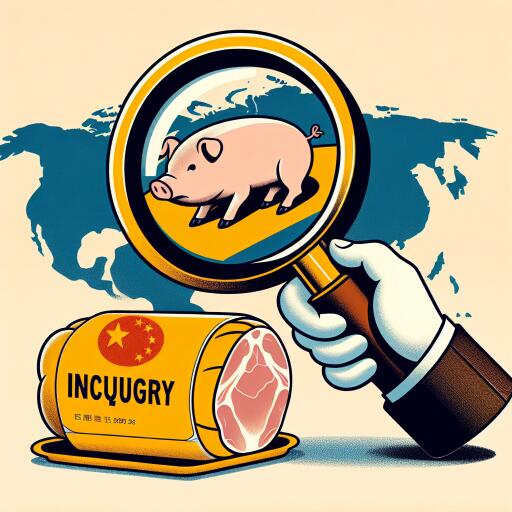China Initiates Anti-Dumping Investigation into EU Pork Imports
In a significant move, China has announced the commencement of an anti-dumping investigation into pork imports from the European Union, highlighting the growing trade tensions between the two major economic entities.
Pork, being the most consumed meat in China, has seen substantial import activities, with customs data revealing that last year’s pork and pork by-products imports from EU nations amounted to over three billion dollars.
This investigation, as stated by Beijing, was triggered by a petition from a local trade association representing the interests of domestic pork producers. The Ministry of Commerce elaborated in a public statement, “The Ministry of Commerce has opened an anti-dumping investigation into imports of relevant pork and pig by-products originating from the European Union.”
This move is perceived as a direct counteraction to the European Commission’s recent imposition of tariffs up to 38 percent on Chinese electric car imports, following an anti-subsidy investigation. The European Commission cited “unfair subsidisation” by China, undermining the economic integrity of EU electric car manufacturers.
The escalating dispute further complicated after the European Commission announced provisional tariff increases on prominent Chinese manufacturers, which prompted vigorous objections from Beijing, denouncing the measures as protectionist and detrimental to Europe’s interests.
In response to the unfolding situation, the European Commission has pledged to closely monitor the proceedings of China’s anti-dumping investigation, to ensure compliance with World Trade Organization rules, emphasizing the importance of fairness and due process.
Spain, being the largest exporter of pork to China within the EU, has expressed hopes for a mutual understanding to resolve the trade friction. Luis Planas, Spain’s Agriculture Minister, highlighted the adverse effects of trade wars, particularly on the agrifood sector, suggesting that such disputes ultimately burden consumers by limiting their choices and purchasing power.
This is not the first instance of China launching investigations into EU export goods. Earlier measures targeted French brandy and a chemical used in engineering, imported from the EU and other global partners, marking a series of escalating trade disputes between China and the EU.
With Germany’s Economy Minister scheduled to visit China, the issue of tariffs and trade barriers is anticipated to be a critical topic of discussion, as both sides seek avenues to protect their respective interests while navigating the complex landscape of international trade relations.
The unfolding scenario underscores the intricate dynamics of global trade disputes and the imperative for dialogue and compromise to mitigate the potential impact on economic and diplomatic relations.
